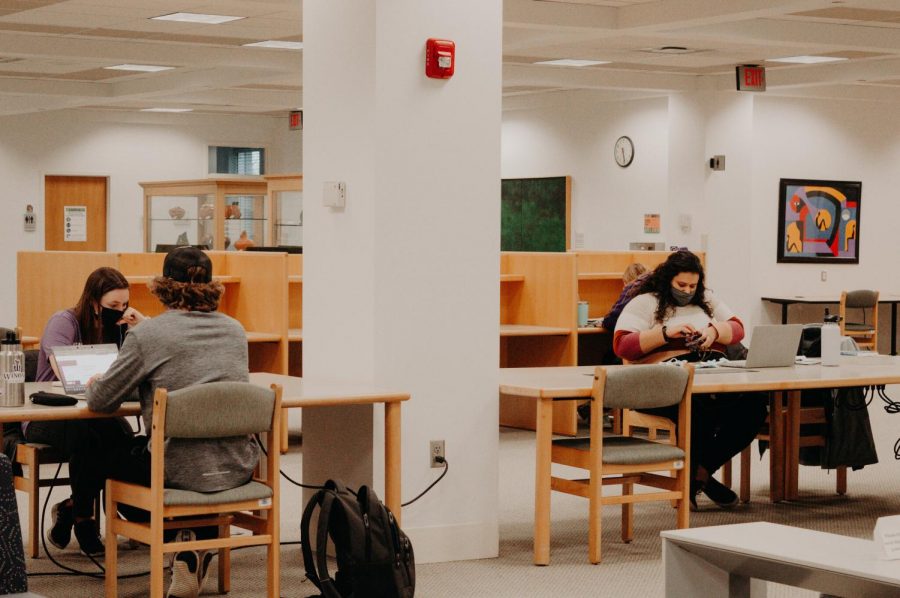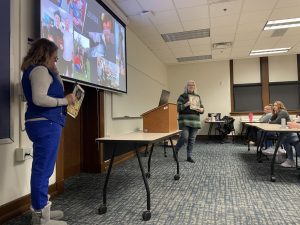WSU considers requiring mental health courses
According to the Assistant professor in the health, exercise and rehabilitative sciences program, Connie Mettille; the courses are designed for learning about mental health issues that are prevalent. The two courses where students can be certified in mental health first aid through the National Alliance on Mental Illness are Mental Health and Society-Youth and Mental Health and Society-Adult.
March 3, 2021
Winona State University offers two courses in which students can be certified in mental health first aid through the National Alliance Mental Illness.
The two courses are Mental Health and Society-Youth and Mental Health and Society-Adult.
Each course is one credit and is completed in five weeks.
The youth course focuses on adults helping youth, while the adult course focuses on adults helping other adults.
The youth course was offered for the first time this spring semester.
The adult course has been offered for two and a half years at Winona State.
Connie Mettille, an assistant professor in the health, exercise and rehabilitative sciences program, said the courses are designed to educate students about mental health issues that are prevalent.
“The courses are designed to teach people the incidence and the prevalence and the issues associated with mental health concerns in our society. The courses teach us noticing skills so we can pay attention when somebody is dealing with an issue that is atypical for them or atypical for anyone,” Mettille said.
The courses provide students with the resources and information to help people who are dealing with a mental health crisis.
“Many people don’t understand what help is out there, what resources are out there. So, this class allows us to have a better understanding of the actions of ourselves and the actions of others,” Mettille said. “It teaches us to approach situations in a safe way, in a healthy way. And then it teaches us when we need to encourage those people to seek more advanced help.”
Mettille said these courses are important especially because of the effects the COVID-19 pandemic has had on individuals.
“We know that mental health concerns are the number one health issue worldwide. We also know that they’ve increased and magnified exponentially during COVID,” Mettille said. “We know that isolation does the opposite of connectedness. We know that and that increases disease. We know that many people are physically getting ill during this time and we know how that affects mental health.”
The courses are not required for any major, although the university has discussed adding one of these courses as a requirement for some majors.
“We’re in discussions right now with many different majors about it becoming part of curriculum, part of majors. Even part of just electives that are out there,” Mettille said. “Nobody that I have spoken to yet in any department debates the importance of this and the necessity of this. But of course, we’re dealing with other factors such as credit limits and, and things like that.”
Mettille said that these courses will help to reduce the stigma of mental health.
“I don’t believe that this class will stop depression. Those are diseases, they have pathogens. They are diseases that affect the brain,” Mettille said. “But we can open up the dialogue. We can reduce the stigma. We can feel more confident and empowered to help others.”
Mettille stressed the importance that those who take this class need to know that they can’t do everything to help, but they can do something.
“We are not doctors, we are not psychologists, we are the people who are dealing with a student or a roommate, or a brother or sister right in front of us,” Mettille said. “And we’re all scared of that process. This class helps to take away that fear and replace it with confidence that you can act and make a difference and I think that’s beautiful.”
Fourth-year special education: developmental disability major, Jordyn Toutant, said she took the youth course this semester because of the importance of mental health.
“I took this class because I wanted to know more about how I can assist people in our society and notice when people are in crisis. Mental health affects 1 out of 5 people, but there is still a stigma around mental health even though it affects so many people in our society,” Toutant said. “I want to learn about mental health and be prepared on how to help others who are going through a mental illness.”
Toutant said that mental health is a problem in society that needs to be addressed.
“To me, mental health is a problem that our society is afraid to acknowledge. Our society puts shame on people with mental health illness and does not see it as a medical illness. Our job is to learn and to educate others to know that people are truly hurting,” Toutant said.
Mettille said she hopes students are able to help people by enrolling in one of these courses.
“Empowered people empower people and what I want to do is help people feel empowered that they can help others,” Mettille said. “Whether that be by noticing something going on, by helping and guiding them and walking through a pathway with them to better self care, to getting a friendly warm hand-off to a resource that will help that person.”


































